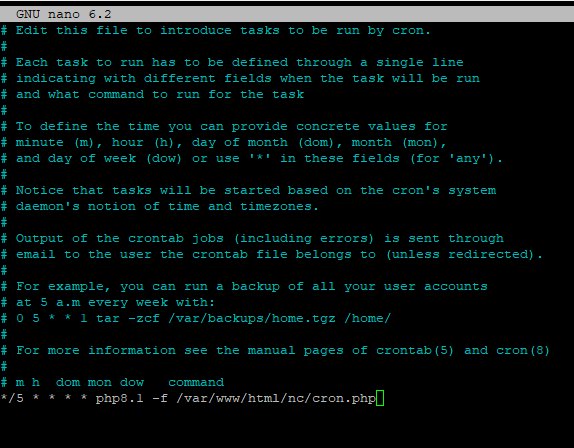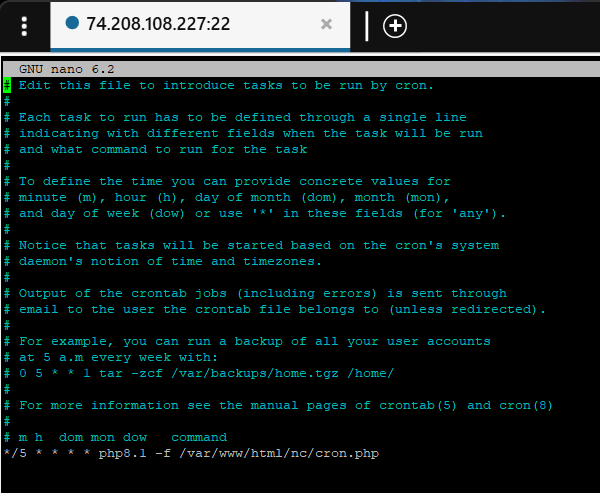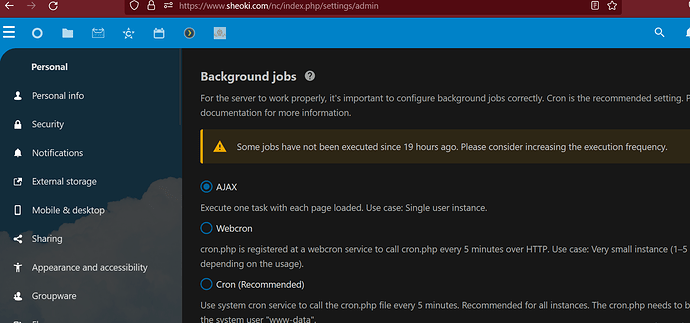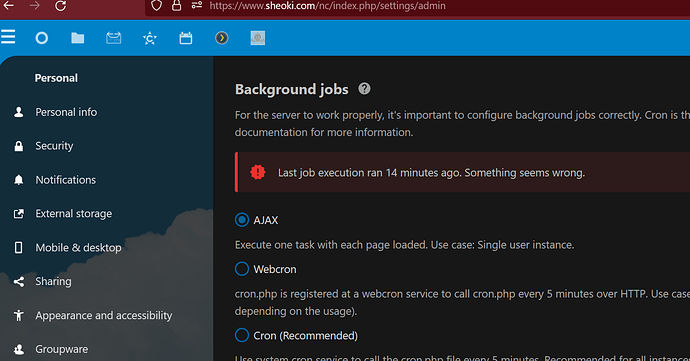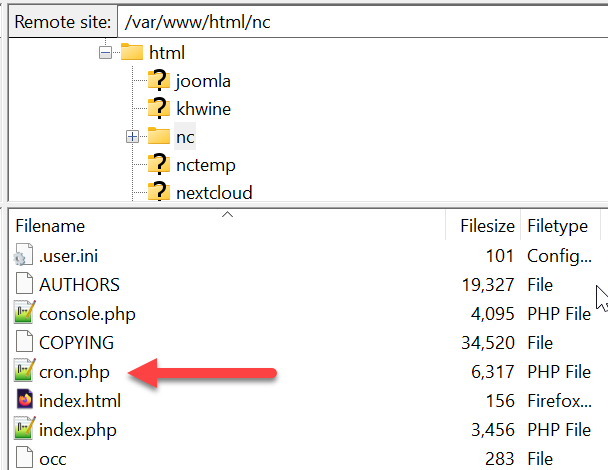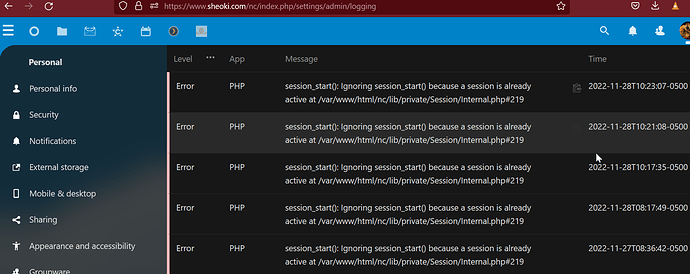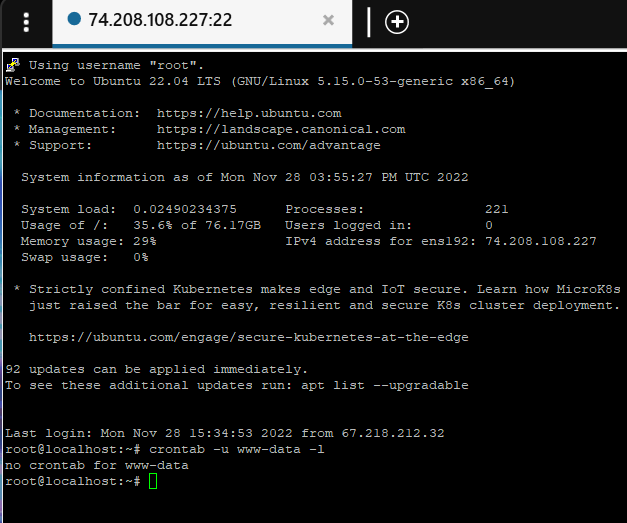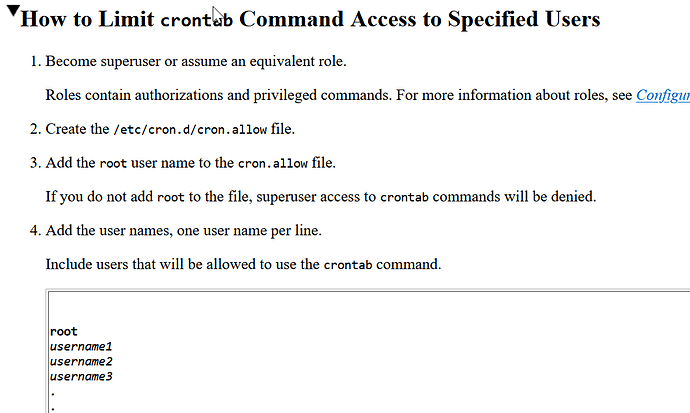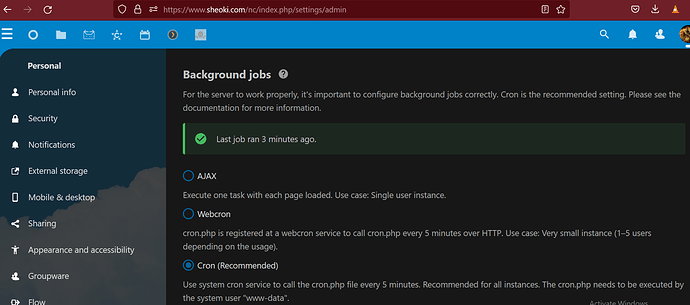[details=“Support intro”]
Sorry to hear you’re facing problems ![]()
help.nextcloud.com is for home/non-enterprise users. If you’re running a business, paid support can be accessed via portal.nextcloud.com where we can ensure your business keeps running smoothly.
The installation of NextCloud 25.0.1 into Ubuntu 22.04 went without any issues. However, in trying to clean-up security and optimize setup I have an issue with “backgroud jobs”.
Error when running default AJAX background job: Some jobs have not been executed since 20 hours ago. Please consider switching to system cron.
So I tried selecting “Cron”, but, it does not run. After looking thru the documentation it seems to depend on if you have “/systemd” or “cli”, etc.
For me the system configuration suggested creating two files nextcloudcron.service and nextcloudcron.timer. The NC docs recommend replacing www-data with my admin user name. Regardless, I tried both ways and nothing changes.
I always get some variation with cron of: Last job execution ran 13 minutes ago. Something seems wrong.
Cron is installed but I’m not clear on using “www-data” or “admin”. The two files now are the SERVICE:
[Unit]
Description=Nextcloud cron.php job
[Service]
User=admin
ExecStart=/usr/bin/php -f /var/www/nc/cron.php
KillMode=process
AND the TIMER:
[Unit]
Description=Run Nextcloud cron.php every minutes
[Timer]
OnBootSec=2min
OnUnitActiveSec=1min
Unit=nextcloudcron.service
[Install]
WantedBy=timers.target
I did increase the php.ini memory to 512 and 64, turned on opcache and cli is enabled.
I’m so confused about how to use this cron solution. Can anyone point me in a direction to use cron on a ubuntu 22.04 install?
Nextcloud version: 25.0.1
Operating system and version: Ubuntu 22.04
Apache: 'Apache/2.4.52 (Ubuntu) PHP version:8.1.6`
MySQL: ‘10.6.11’
The issue you are facing:
Backgound jobs no running correctly.
Is this the first time you’ve seen this error? (Y/N):N
Steps to replicate it:
- Install NC 25.0.1
- Set “Cron” or “AJAX” as backgroud job manager
- Fails within 5 minutes
The output of your Nextcloud log in Admin > Logging:
cron.php file|config.php file|
CRON.PHP…
<?php /** * @copyright Copyright (c) 2016, ownCloud, Inc. * * @author Artem Sidorenko * @author Christopher Schäpers * @author Christoph Wurst * @author Daniel Kesselberg * @author hoellen * @author J0WI * @author Jakob Sack * @author Joas Schilling * @author Jörn Friedrich Dreyer * @author Ko- * @author Michael Kuhn * @author Morris Jobke * @author Oliver Kohl D.Sc. * @author Robin Appelman * @author Roeland Jago Douma * @author Steffen Lindner * @author Thomas Müller * @author Vincent Petry * @author Stephen Michel * * @license AGPL-3.0 * * This code is free software: you can redistribute it and/or modify * it under the terms of the GNU Affero General Public License, version 3, * as published by the Free Software Foundation. * * This program is distributed in the hope that it will be useful, * but WITHOUT ANY WARRANTY; without even the implied warranty of * MERCHANTABILITY or FITNESS FOR A PARTICULAR PURPOSE. See the * GNU Affero General Public License for more details. * * You should have received a copy of the GNU Affero General Public License, version 3, * along with this program. If not, see * */ require_once __DIR__ . '/lib/versioncheck.php'; try { require_once __DIR__ . '/lib/base.php'; if (\OCP\Util::needUpgrade()) { \OC::$server->getLogger()->debug('Update required, skipping cron', ['app' => 'cron']); exit; } if ((bool) \OC::$server->getSystemConfig()->getValue('maintenance', false)) { \OC::$server->getLogger()->debug('We are in maintenance mode, skipping cron', ['app' => 'cron']); exit; } // load all apps to get all api routes properly setup OC_App::loadApps(); \OC::$server->getSession()->close(); // initialize a dummy memory session $session = new \OC\Session\Memory(''); $cryptoWrapper = \OC::$server->getSessionCryptoWrapper(); $session = $cryptoWrapper->wrapSession($session); \OC::$server->setSession($session); $logger = \OC::$server->getLogger(); $config = \OC::$server->getConfig(); $tempManager = \OC::$server->getTempManager(); // Don't do anything if Nextcloud has not been installed if (!$config->getSystemValue('installed', false)) { exit(0); } $tempManager->cleanOld(); // Exit if background jobs are disabled! $appMode = $config->getAppValue('core', 'backgroundjobs_mode', 'ajax'); if ($appMode === 'none') { if (OC::$CLI) { echo 'Background Jobs are disabled!' . PHP_EOL; } else { OC_JSON::error(['data' => ['message' => 'Background jobs disabled!']]); } exit(1); } if (OC::$CLI) { // set to run indefinitely if needed if (strpos(@ini_get('disable_functions'), 'set_time_limit') === false) { @set_time_limit(0); } // the cron job must be executed with the right user if (!function_exists('posix_getuid')) { echo "The posix extensions are required - see https://www.php.net/manual/en/book.posix.php" . PHP_EOL; exit(1); } $user = posix_getuid(); $configUser = fileowner(OC::$configDir . 'config.php'); if ($user !== $configUser) { echo "Console has to be executed with the user that owns the file config/config.php" . PHP_EOL; echo "Current user id: " . $user . PHP_EOL; echo "Owner id of config.php: " . $configUser . PHP_EOL; exit(1); } // We call Nextcloud from the CLI (aka cron) if ($appMode !== 'cron') { $config->setAppValue('core', 'backgroundjobs_mode', 'cron'); } // Low-load hours $onlyTimeSensitive = false; $startHour = $config->getSystemValueInt('maintenance_window_start', 100); if ($startHour <= 23) { $date = new \DateTime('now', new \DateTimeZone('UTC')); $currentHour = (int) $date->format('G'); $endHour = $startHour + 4; if ($startHour <= 20) { // Start time: 01:00 // End time: 05:00 // Only run sensitive tasks when it's before the start or after the end $onlyTimeSensitive = $currentHour < $startHour || $currentHour > $endHour; } else { // Start time: 23:00 // End time: 03:00 $endHour -= 24; // Correct the end time from 27:00 to 03:00 // Only run sensitive tasks when it's after the end and before the start $onlyTimeSensitive = $currentHour > $endHour && $currentHour < $startHour; } } // Work $jobList = \OC::$server->getJobList(); // We only ask for jobs for 14 minutes, because after 5 minutes the next // system cron task should spawn and we want to have at most three // cron jobs running in parallel. $endTime = time() + 14 * 60; $executedJobs = []; while ($job = $jobList->getNext($onlyTimeSensitive)) { if (isset($executedJobs[$job->getId()])) { $jobList->unlockJob($job); break; } $logger->debug('CLI cron call has selected job with ID ' . strval($job->getId()), ['app' => 'cron']); $job->execute($jobList, $logger); // clean up after unclean jobs \OC_Util::tearDownFS(); $tempManager->clean(); $jobList->setLastJob($job); $executedJobs[$job->getId()] = true; unset($job); if (time() > $endTime) { break; } } } else { // We call cron.php from some website if ($appMode === 'cron') { // Cron is cron :-P OC_JSON::error(['data' => ['message' => 'Backgroundjobs are using system cron!']]); } else { // Work and success :-) $jobList = \OC::$server->getJobList(); $job = $jobList->getNext(); if ($job != null) { $logger->debug('WebCron call has selected job with ID ' . strval($job->getId()), ['app' => 'cron']); $job->execute($jobList, $logger); $jobList->setLastJob($job); } OC_JSON::success(); } } // Log the successful cron execution $config->setAppValue('core', 'lastcron', time()); exit(); } catch (Exception $ex) { \OC::$server->getLogger()->logException($ex, ['app' => 'cron']); echo $ex . PHP_EOL; exit(1); } catch (Error $ex) { \OC::$server->getLogger()->logException($ex, ['app' => 'cron']); echo $ex . PHP_EOL; exit(1); } ************************************************************************ Config.php... <?php $CONFIG = array ( 'instanceid' => 'xxx', 'passwordsalt' => 'xxx', 'secret' => 'xxx', 'trusted_domains' => array ( 0 => 'www.sheoki.com', ), 'datadirectory' => '/var/www/html/nc/data', 'dbtype' => 'mysql', 'version' => '25.0.1.1', 'overwrite.cli.url' => 'https://www.sheoki.com/nc', 'dbname' => 'nc', 'dbhost' => 'localhost:3306', 'dbport' => '', 'dbtableprefix' => 'oc_', 'mysql.utf8mb4' => true, 'dbuser' => 'nc22ad', 'dbpassword' => 'xxx', 'installed' => true, 'mail_smtpmode' => 'smtp', 'mail_smtpsecure' => 'tls', 'mail_sendmailmode' => 'smtp', 'mail_from_address' => 'info', 'mail_domain' => 'sheoki.com', 'mail_smtpauthtype' => 'LOGIN', 'mail_smtpauth' => 1, 'mail_smtphost' => 'smtp.ionos.com', 'mail_smtpport' => '587', 'mail_smtpname' => 'info@sheoki.com', 'mail_smtppassword' => 'xxx', 'default_phone_region' => 'US', 'app_install_overwrite' => array ( 0 => 'apporder', ), 'maintenance' => false, );